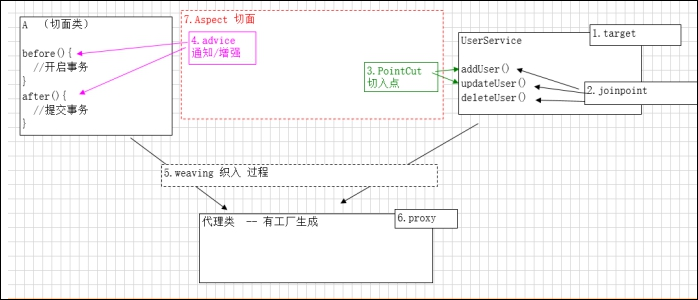spring(二) AOP注入
AOP概念
l AOP采取横向抽取机制,取代了传统纵向继承体系重复性代码
l 经典应用:事务管理、性能监视、安全检查、缓存 、日志等
l Spring AOP使用纯Java实现,不需要专门的编译过程和类加载器,在运行期通过代理方式向目标类织入增强代码
l AspectJ是一个基于Java语言的AOP框架,Spring2.0开始,Spring AOP引入对Aspect的支持,AspectJ扩展了Java语言,提供了一个专门的编译器,在编译时提供横向代码的织入
Aop的实现原理
l aop底层将采用代理机制进行实现。
专业术语
1.target:目标类,需要被代理的类。例如:UserService
2.Joinpoint(连接点):所谓连接点是指那些可能被拦截到的方法。例如:所有的方法
3.PointCut 切入点:已经被增强的连接点。例如:addUser()
4.advice 通知/增强,增强代码。例如:after、before
5. Weaving(织入):是指把增强advice应用到目标对象target来创建新的代理对象proxy的过程.
6.proxy 代理类
7. Aspect(切面): 是切入点pointcut和通知advice的结合
一个线是一个特殊的面。
一个切入点和一个通知,组成成一个特殊的面。

1.execution() 用于描述方法 【掌握】
语法:execution(修饰符 返回值 包.类.方法名(参数) throws异常)
修饰符,一般省略
public 公共方法
* 任意
返回值,不能省略
void 返回没有值
String 返回值字符串
* 任意
包,[省略]
com.itheima.crm 固定包
com.itheima.crm.*.service crm包下面子包任意 (例如:com.itheima.crm.staff.service)
com.itheima.crm.. crm包下面的所有子包(含自己)
com.itheima.crm.*.service.. crm包下面任意子包,固定目录service,service目录任意包
类,[省略]
UserServiceImpl 指定类
*Impl 以Impl结尾
User* 以User开头
* 任意
方法名,不能省略
addUser 固定方法
add* 以add开头
*Do 以Do结尾
* 任意
(参数)
() 无参
(int) 一个整型
(int ,int) 两个
(..) 参数任意
throws ,可省略,一般不写。
2.within:匹配包或子包中的方法(了解)
within(com.itheima.aop..*)
3.this:匹配实现接口的代理对象中的方法(了解)
this(com.itheima.aop.user.UserDAO)
4.target:匹配实现接口的目标对象中的方法(了解)
target(com.itheima.aop.user.UserDAO)
5.args:匹配参数格式符合标准的方法(了解)
args(int,int)
6.bean(id) 对指定的bean所有的方法(了解)
bean('userServiceId')
=======================================================================================
实例 :AOP基于xml配置开发
UserAOP.xml
<?xml version="1.0" encoding="UTF-8"?>
<beans xmlns="http://www.springframework.org/schema/beans"
xmlns:xsi="http://www.w3.org/2001/XMLSchema-instance"
xmlns:aop="http://www.springframework.org/schema/aop" xsi:schemaLocation="
http://www.springframework.org/schema/beans
http://www.springframework.org/schema/beans/spring-beans.xsd
http://www.springframework.org/schema/aop
http://www.springframework.org/schema/aop/spring-aop.xsd"> <bean id="aspectUser" class="com.spring_aop1.AspectUser"></bean>
<bean id="user" class="com.spring_aop1.User"></bean> <aop:config>
<!-- expression="execution(返回值 包名.类名.方法名(参数类型)) id="任意":切入点名 -->
<aop:pointcut expression="execution(* com.spring_aop1.*.*(..))" id="myPointcut"/> <aop:aspect ref="aspectUser">
<aop:before method="password" pointcut-ref="myPointcut"/>
<aop:after-returning method="after" pointcut-ref="myPointcut" returning="obj"/>
<!-- <aop:around method="around" pointcut-ref="myPointcut" /> -->
<aop:around method="aroundR" pointcut-ref="myPointcut" /> <aop:after-throwing method="throwable" pointcut-ref="myPointcut" throwing="e"/>
</aop:aspect> </aop:config> </beans>
User.java
package com.spring_aop1;
public class User {
private String str;
public String getStr() {
return str;
}
public void setStr(String str) {
this.str = str;
}
public void insert(){
System.out.println("insert====ok");
}
public void delete(){
System.out.println("delete====ok");
}
public void update(){
System.out.println("update====ok");
}
public void selete(){
System.out.println("insert====ok");
}
}
AspectUser.java
package com.spring_aop1; import org.aspectj.lang.JoinPoint;
import org.aspectj.lang.ProceedingJoinPoint; public class AspectUser { /**
* 定义一个前置通知
* */
public void password(){
System.out.println("前置通知:密码验证=====成功");
} /**
* 定义一个后置通知(可得方法返回值)
* @param jp execution(void com.spring_aop.User.save())
* @param obj
* */
public void after(JoinPoint jp,Object obj){
String name = jp.getSignature().getName(); System.out.println("后置通知:after获取一个返回值类型====切入点");
System.out.println("after返回值信息为:"+name);
} /**
* 定义一个环绕通知
* @param pjp execution(void com.spring_aop.User.save())
* */
public void around(ProceedingJoinPoint pjp) throws Throwable{
System.out.println("环绕通知:around执行环绕通知前执行");
pjp.proceed();
System.out.println("环绕通知:around执行环绕通知后执行");
}
/**
* 定义一个环绕通知(可得方法返回值)
* @throws Throwable
* */
public Object aroundR(ProceedingJoinPoint pjp) throws Throwable{
System.out.println("环绕通知:around执行环绕通知前执行");
Object obj = pjp.proceed();
System.out.println("环绕通知:around执行环绕通知后执行"); String s = pjp.getSignature().getName();
System.out.println("around返回值的类型:"+obj+" around返回方法名:"+s);
return obj;
} /**
* 定义一个异常通知(可得方法返回值)
* @throws Throwable
* */
public void throwable(JoinPoint jp,Throwable e){
System.out.println("到我这里来,说明 你发生了异常======");
} }
Test.java
package com.spring_aop1; import org.springframework.context.ApplicationContext;
import org.springframework.context.support.ClassPathXmlApplicationContext; public class UserTest { public static void main(String[] args) { String str = "com/spring_aop1/UserAop.xml";
ApplicationContext context = new ClassPathXmlApplicationContext(str); User user = (User)context.getBean("user");
user.insert(); } }
实例 :AOP基于注解开发
UserAOP.xml
<?xml version="1.0" encoding="UTF-8"?>
<beans xmlns="http://www.springframework.org/schema/beans"
xmlns:xsi="http://www.w3.org/2001/XMLSchema-instance"
xmlns:aop="http://www.springframework.org/schema/aop"
xmlns:context="http://www.springframework.org/schema/context" xsi:schemaLocation="
http://www.springframework.org/schema/beans
http://www.springframework.org/schema/beans/spring-beans.xsd
http://www.springframework.org/schema/aop
http://www.springframework.org/schema/aop/spring-aop.xsd
http://www.springframework.org/schema/context
http://www.springframework.org/schema/context/spring-context.xsd"> <!-- 自动扫描 配置 扫描所有注解 :使用注解注入 -->
<context:component-scan base-package="com.spring_aop2"></context:component-scan> <!-- 添加AOP的注解扫描 -->
<aop:aspectj-autoproxy></aop:aspectj-autoproxy> </beans>
User.java
package com.spring_aop2; import org.springframework.stereotype.Component; @Component(value="user")
public class User { private String str; public String getStr() {
return str;
}
public void setStr(String str) {
this.str = str;
} public void insert(){
System.out.println("insert====ok");
}
public void delete(){
System.out.println("delete====ok");
}
public void update(){
System.out.println("update====ok");
int i = 1/0;
}
public void selete(){
System.out.println("insert====ok");
} }
AspectUser.java
package com.spring_aop2; import org.aspectj.lang.JoinPoint;
import org.aspectj.lang.ProceedingJoinPoint;
import org.aspectj.lang.annotation.After;
import org.aspectj.lang.annotation.AfterReturning;
import org.aspectj.lang.annotation.AfterThrowing;
import org.aspectj.lang.annotation.Around;
import org.aspectj.lang.annotation.Aspect;
import org.aspectj.lang.annotation.Before;
import org.aspectj.lang.annotation.Pointcut;
import org.springframework.stereotype.Component; @Component("aspectUser") //组件
@Aspect //声明这是一个切面类
public class AspectUser { /**
* <aop:pointcut
* expression="execution(* com.spring_aop2.*.*(..))"
* id="myPointcut" />
* */
@Pointcut("execution(* com.spring_aop2.*.*(..))")
private void myPoint(){} /**
* 定义一个前置通知
* */
@Before("execution(* com.spring_aop2.*.*(..))") //指向切入点的Id(私有方法的方法名)
public void password(){
System.out.println("前置通知:密码验证=====成功");
} /**
* 定义一个后置通知(可得方法返回值)
* @param jp execution(void com.spring_aop.User.save())
* @param obj
* */
@AfterReturning(value="myPoint()",returning="obj")
public void after(JoinPoint jp,Object obj){
String name = jp.getSignature().getName(); System.out.println("后置通知:获取一个返回值类型====切入点");
System.out.println("after返回值信息为:"+name);
} /**
* 定义一个环绕通知
* @param pjp execution(void com.spring_aop.User.save())
* */
@Around("execution(* com.spring_aop.*.*(..))")
public void around(ProceedingJoinPoint pjp) throws Throwable{
System.out.println("环绕通知:around执行环绕通知前执行");
pjp.proceed();
System.out.println("环绕通知:around执行环绕通知后执行");
}
/**
* 定义一个环绕通知(可得方法返回值)
* @throws Throwable
* */
public Object aroundR(ProceedingJoinPoint pjp) throws Throwable{
System.out.println("环绕通知:around执行环绕通知前执行");
Object obj = pjp.proceed();
System.out.println("环绕通知:around执行环绕通知后执行"); String s = pjp.getSignature().getName();
System.out.println("around返回值的类型:"+obj+" around返回方法名:"+s);
return obj;
} /**
* 定义一个异常通知(可得方法返回值)
* @throws Throwable
* */
@AfterThrowing(value="myPoint()",throwing="e")
public void throwable(JoinPoint jp,Throwable e){
System.out.println("到我这里来,说明 你发生了异常======");
} }
Test.java
package com.spring_aop2; import org.springframework.context.ApplicationContext;
import org.springframework.context.support.ClassPathXmlApplicationContext; public class UserTest { public static void main(String[] args) { String str = "com/spring_aop2/UserAop.xml"; ApplicationContext context = new ClassPathXmlApplicationContext(str); User user = (User)context.getBean("user");
user.insert();
//user.update(); } }
spring(二) AOP注入的更多相关文章
- spring(二) AOP之AspectJ框架的使用
前面讲解了spring的特性之一,IOC(控制反转),因为有了IOC,所以我们都不需要自己new对象了,想要什么,spring就给什么.而今天要学习spring的第二个重点,AOP.一篇讲解不完,所以 ...
- Spring之AOP二
在Spring之AOP一中使用动态代理将日志打印功能注入到目标对象中,其实这就是AOP实现的原理,不过上面只是Java的实现方式.AOP不管什么语言它的几个主要概念还是有必要了解一下的. 一.AOP概 ...
- Spring(二)--IoC&AOP
IOC 一.IOC概述: 一般指控制反转(inversion of Control),把创建对象的权利交给框架,Ioc容器控制对象,是框架的重要特征,并非是面向对象编程的专用术语.它包括依赖注入(DI ...
- spring源码分析(二)Aop
创建日期:2016.08.19 修改日期:2016.08.20-2016.08.21 交流QQ:992591601 参考资料:<spring源码深度解析>.<spring技术内幕&g ...
- Spring学习笔记(二)Spring基础AOP、IOC
Spring AOP 1. 代理模式 1.1. 静态代理 程序中经常需要为某些动作或事件作下记录,以便在事后检测或作为排错的依据,先看一个简单的例子: import java.util.logging ...
- 框架应用:Spring framework (二) - AOP技术
基础概念 线程中的方法栈 java程序虚拟机启动时会载入程序码,虚拟机会为每一条正在运行的线程生成一个方法调用栈,线程以方法运行为执行单位. AOP概念以及目标 AOP是面向切面编程,其实就是在不修改 ...
- spring学习(二) ———— AOP之AspectJ框架的使用
前面讲解了spring的特性之一,IOC(控制反转),因为有了IOC,所以我们都不需要自己new对象了,想要什么,spring就给什么.而今天要学习spring的第二个重点,AOP.一篇讲解不完,所以 ...
- SpringBoot系列: 理解 Spring 的依赖注入(二)
==============================Spring 容器中 Bean 的名称==============================声明 bean 有两个方式, 一个是 @B ...
- Spring中AOP主要用来做什么。Spring注入bean的方式。什么是IOC,什么是依赖注入
Spring中主要用到的设计模式有工厂模式和代理模式. IOC:Inversion of Control控制反转,也叫依赖注入,通过 sessionfactory 去注入实例:IOC就是一个生产和管理 ...
- 09 Spring框架 AOP (二) 高级用法
上一篇文章我们主要讲了一点关于AOP编程,它的动态考虑程序的运行过程,和Spring中AOP的应用,前置通知,后置通知,环绕通知和异常通知,这些都是Spring中AOP最简单的用法,也是最常用的东西, ...
随机推荐
- AIX系统的备份和恢复
1.AIX备份命令
- linux yum错误
一. 错误:File contains no section headers. file: file:///etc/yum.repos.d/upgrade.repo, line: 1 'name=Ce ...
- 【原】iptables 交叉编译
防火墙在做数据包过滤决定时,有一套遵循和组成的规则,这些规则存储在专用的数据包过滤表中,而这些表集成在 Linux 内核中.在数据包过滤表中,规则被分组放在我们所谓的链(chain)中.而netfil ...
- SpringBootMVC02——SpringDataJpa与ThymeLeaf
大纲 - SpringDataJpa进阶使用- SpringDataJpa自定义查询- 整合Servlet.Filter.Listener- 文件上传- Thymeleaf常用标签 1.整合Servl ...
- Linux中profile(转载)
原文地址:http://www.cnblogs.com/mmfzmd517528/archive/2012/07/05/2577988.html 标黄是个人批注. 环境变量就是一个系统变量,系统配置一 ...
- QT中获取选中的radioButton的两种方法
QT中要获取radioButton组中被选中的那个按钮,可以采用两种如下两种办法进行: 方法一:采用对象名称进行获取 代码: 1 QRadioButton* pbtn = qobject_cast&l ...
- python接口自动化六(参数化也就是把之前敲过的代码封装成方法)
前言 前面一篇实现了参数的关联,那种只是记流水账的完成功能,不便于维护,也没什么可读性,接下来这篇可以把每一个动作写成一个函数,这样更方便了. 参数化的思维只需记住一点:不要写死 (由于博客园登录机制 ...
- 对TypeScript进行研究
1.npm install -g typescript 在编辑器,将下面的代码输入到greeter.ts文件里: function greeter(person) { return "Hel ...
- 导出csv文件(使用a标签)
https://blog.csdn.net/oscar999/article/details/16342699 productsCSV(e) { const { download } = this ...
- Maven手动命令行导入ojdbc6
Maven项目中导入Oracle的驱动包时,可能会出现像我一样下载资源不成功的情况,如下图所示: 出现这种情况的原因其实是因为Oracle的授权问题,这样的话,我们在需要使用Oracle的驱动包时, ...
